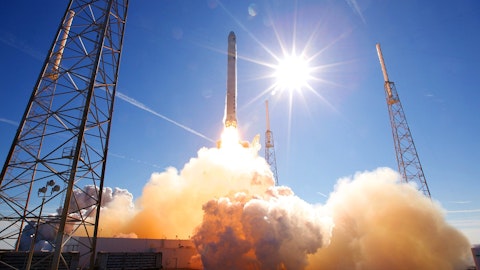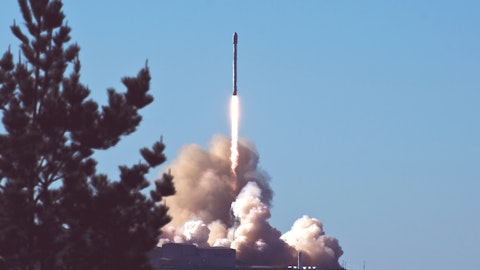Chris Kemp: Well, you characterized the spacecraft engine business is lumpy. I think that we have secured a number of orders where we are now delivering spacecraft engines. We noted last quarter that we would deliver the first couple of engines out of our new facility. We did that. We intend to increase the rate at which we ship and recognize revenue for these spacecraft engines next quarter, the following quarter, the quarter after that. And we have pretty good visibility into the supply chain and the amount of inventory that we have on hands. And at least in the near term, the risk associated with the deliveries of the spacecraft engines over the next couple of quarters is something we well understand and due to the fact that we’re manufacturing the majority of these components in-house, we have a lot of control over as well.
So I would kind of disagree with your characterization of the lumpiness or lack of control we have over the next couple of quarters’ deliveries to be sure. And beyond that, I think we’re going to continue to focus on refining the business operating as efficiently as possible so that we continue to see the cash we have and we’re able to raise in capital markets last well into that ramp of spacecraft engine deliveries and the launch team remains focused on threading that needle between making sure that we have a vehicle that we’re very proud of, that will have high margins that will operate reliably before we’re not obviously going to take so much time that we don’t have the opportunity to do some test lights and show the market how much we’ve learned from the last six or seven years of building and successfully launching satellites into orbit, something very few companies that actually had the opportunity to do.
And that’s what – that’s management’s challenge right now. We understand the challenging capital markets environment. And all we can do is bring in cash and revenue from customers, delivering for our customers and be as efficient as we possibly can be as we bring these products back out to the market.
Axel Martinez: And if I can also, I think, it’s not just about revenue recognition when it comes to our business. The cash profile of our business is very friendly as we talked about several times in our last few earnings calls, the significant amount of cash that is paid as we deliver on these co-engineering milestones. And so there’s a great opportunity to continue to bring liquidity into our business just from continuing to deliver for our customers both on the, co-engineering phase of each contract, but also as we deliver more engines. And as Chris mentioned, there’s great opportunities ahead of us in terms of new contracts and new sales. And so the best thing we can continue to do and this is why we allocated the resources that we did is to focus on deliveries because we want to make sure that our customers are happy with what we’re delivering, when we’re delivering things for them.
And we have the leading system in spacecraft engine in the market. And so we feel that we’ll continue to have opportunities to grow the business going forward. And so with that, cash profile that is already embedded in the business, we think that will be – continue to be a great source of liquidity for us. And just to wrap up, I think, on the facility that we put in place about 10 days that we announced 10 days ago, it gives us, I think, it’s a financial group that perform due diligence on the company and really is a testament to the fact that this company has access to capital markets, right? Of course, we started with our ATM. Now we put this in place. We’re bringing in PJT to help us manage the process going forward, but we feel that we – from a fundamentals perspective, our business is very strong.
Andre Madrid: Understood. Thank you.




